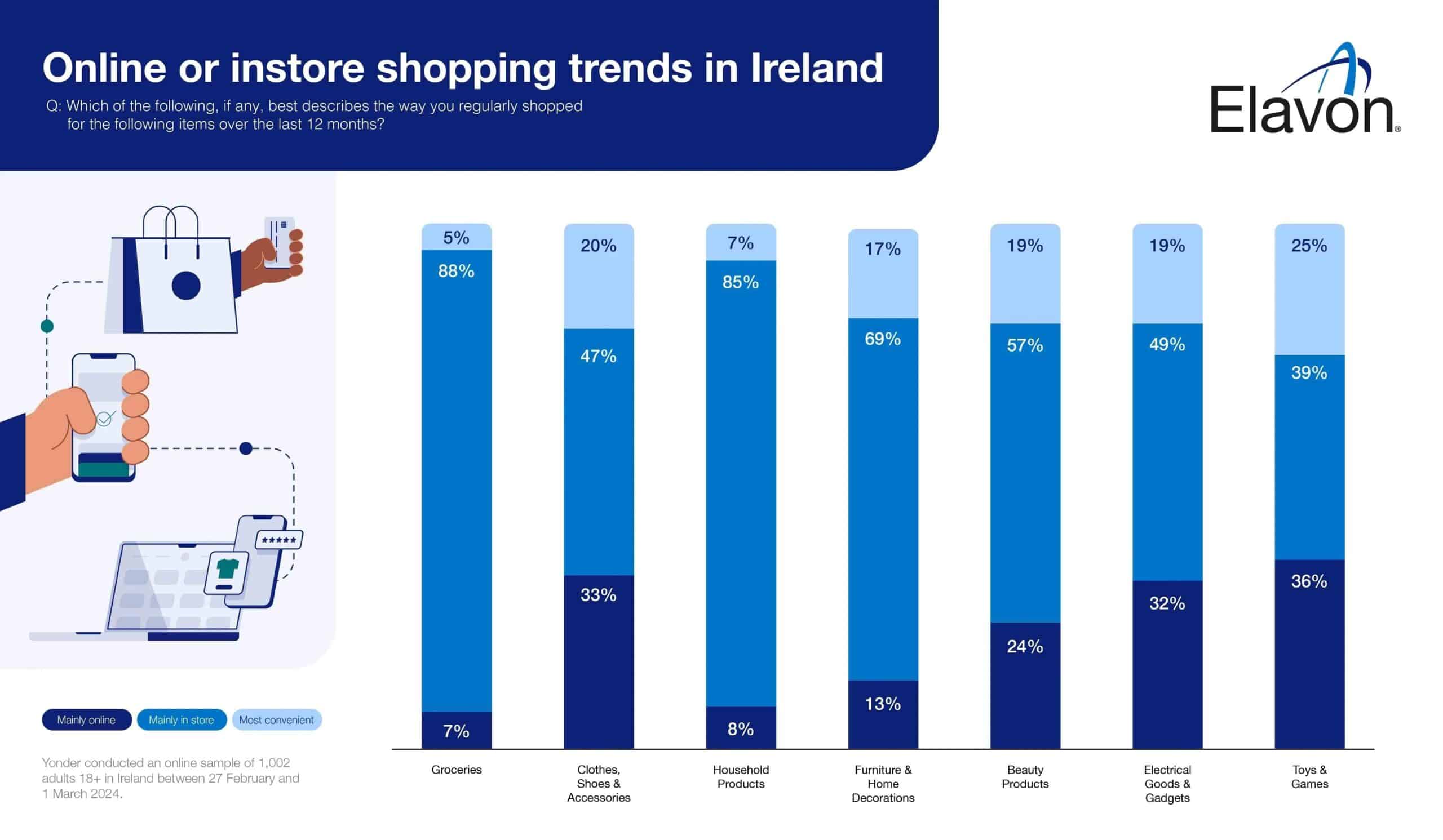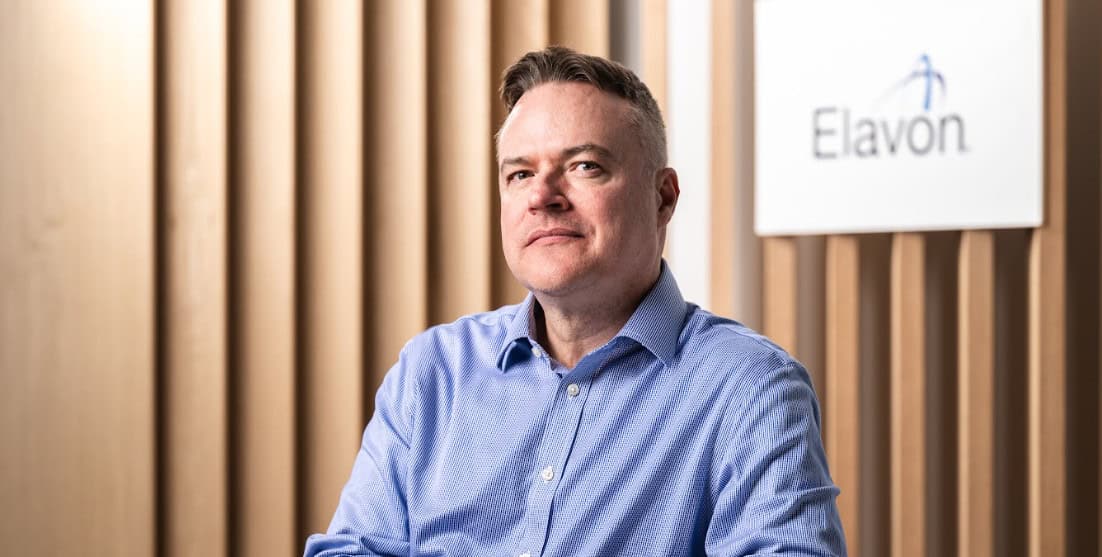Pictured: Scott Frisby, Head of Strategy at Elavon Europe
Elavon: Our survey shows Irish consumers’ spending habits. This fascinating insight into where people do their shopping will help businesses better serve their customers.
Research by Elavon shows where consumers prefer to shop, with the data showing that the main street is not dead, just different.
The fascinating insight into Irish spending habits shows that consumers like choice when it comes to when and how they buy things – which includes how they pay. It shows a need to diversify.
In an online survey commissioned by Elavon of more than 1,000 adults in Ireland, people were asked whether they shopped mostly online or instore for:
- Groceries
- Household products
- Clothes, shoes and accessories
- Beauty products
- Furniture and home decorations
- Electrical goods and gadgets
- Toys and games.
The results show that across Ireland, most shopping is done in-store – but younger people are more likely to shop online than older people.
The results broadly reflect the same survey carried out by Yonder on behalf of Elavon last year, suggesting these shopping habits are here to stay.

“While there was a move from the high street to online shopping in recent years, accelerated by the 2020 COVID pandemic, these results show the high street is not dead, just different,” says Scott Frisby, Head of Strategy at Elavon Europe.
“But it also shows that it’s important for businesses to diversify, to offer different ways to pay – either in-person at a shop, or online. Offering both these is known as omnicommerce.
“We can see that the supermarket shop, including independent food shops, remains the primary way people buy their groceries and household products, such as washing-up liquid.
“Similarly, there’s a strong showing for in-store for items shoppers want to actually see, such as furniture, beauty products and clothes.”
This idea reflects separate research by Elavon which revealed the primary reason people visit a shop is to see an item in person. This might be to try on clothes or sit on a settee to check it is comfortable before buying.
Multicommerce
Another arresting piece of data highlights the importance of convenience to the consumer.
For all the categories except groceries and household products, convenience was important to about a fifth of all respondents. Younger people are even more likely to be swayed by this, with about a quarter of under 24-year-olds picking this option on the survey.
“Here we see consumers just going with the easiest place to buy. Here’s an opportunity for you, the retailer, to give yourself an edge over your competitors,” says Frisby.
“Make sure you offer different ways to pay, and make it a smooth, seamless process. This might be offering a self-checkout kiosk, self-scan and pay, paying at a traditional till, or a combination of those different methods.
“It might involve what we call de-coupling of the payment process from the delivery of service, where customers order their items and pay for it, freeing up your staff from the administrative process of payment.
“This is frequently already available in larger chains, but we see no reason why it won’t increasingly be taken up in smaller businesses, in both retail and hospitality.”
The data in greater depth
If you take a closer look at the survey results, the data shows that younger people are much more likely to shop online.
Groceries and household products remain broadly the same for all age groups. But for beauty products, those under 34 are almost as likely to shop online as they are at a store.
Meanwhile about half of all adults aged 18-34 years buy electrical goods online, while fewer than a third do so in-store.
Conversely, almost two thirds (59%) of 55- to 64-year-olds shop in-store and 72% of over-65s buy electrical goods in a shop.
For adults who buy toys and games, again, the under 34s buy online more frequently than in a shop, but it is not as strong a preference as for electrical goods.
Interestingly, men who buy electrical gadgets are much more likely to go online (at 36%) than women (27%).
“Our data shows that shoppers like choice,” says Frisby. “As a retailer, you need to understand your customer and how they want to buy.
“Choose a payments provider that will help guide you through the many different options available, so you’re not unnecessarily putting off custom.”
Elavon carries out research on a range of topics that aims to educate and inform business. For more articles like this, visit Elavon.ie/insights
A relationship that embodies ‘togetherness’
The relationship between Swedish multinational retailer IKEA and Elavon started in 2012.
Elavon now processes an incredible seven million IKEA transactions monthly across 11 markets, covering in-store, ecommerce and remote sales, as well as software point-of-sale terminals.
But it’s so much more. Elavon supplies real-time payments data for every store and country where it works with IKEA, helping the retailer make better business decisions.
“I’d sum up the working relationship I have with Elavon in one word: easy,” says Sam Langsford, inbound payments specialist for IKEA, at parent company Ingka Group.

Sam Langsford, inbound payments specialist for IKEA, at parent company Ingka Group
“The fact that we can manage such a huge responsibility area has only been possible because we’ve had such key payment relationships as we do with Elavon.”
One of the key benefits of the working relationship between Elavon and IKEA is the rich source of data.
If a customer pays with a card at a checkout terminal in a store, it goes into the same channel of information as those who enter their card details online.
And that data is captured in almost real-time. IKEA can make better decisions to serve its customers, thanks to the payments data it receives from Elavon.
But the relationship is more than just spreadsheets and data.
“Our relationship feels like it’s an internal one,” says Sam. “We have that depth of understanding so, for me, that sets Elavon apart from others.”

For more information, see here.

